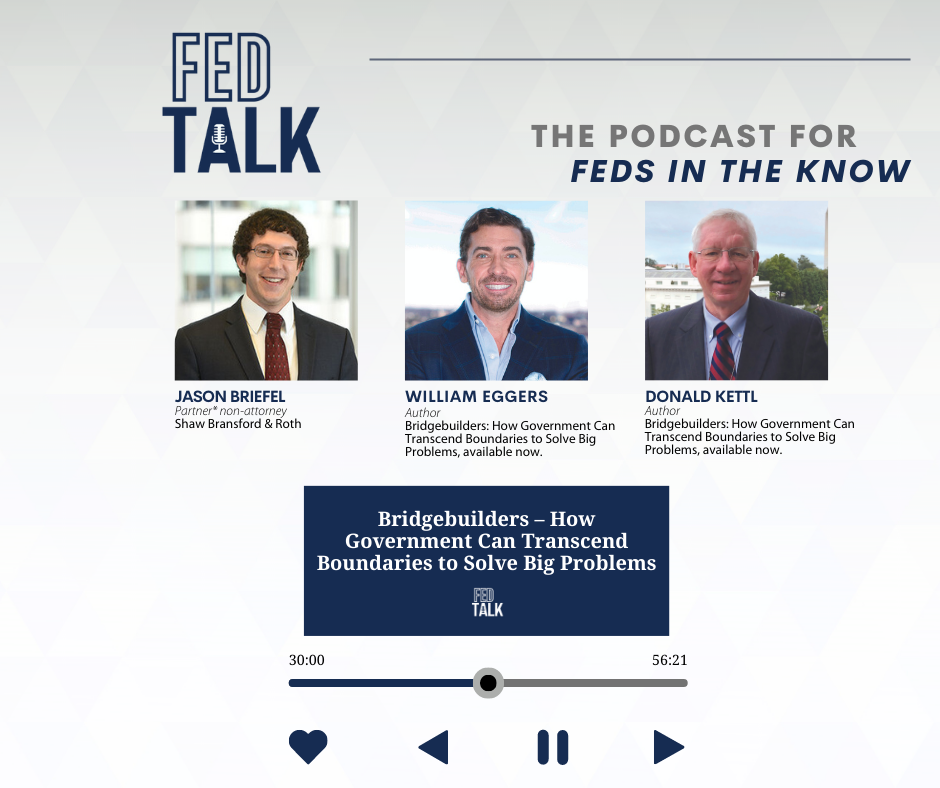Building Bridges in Government and Beyond to Solve Big Problems
The political and social climate in today’s world makes passing legislation a tough task, and that same climate makes implementing major legislation or other programs an even bigger obstacle. The latest episode of FEDTalk reviewed the federal government’s various challenges when it comes to implementing legislation and programs. The guests discussed ways to build bridges to improve outcomes.
The focus of the discussion was on the new book from authors William Eggers and Donald Kettl “Bridgebuilders: How Government Can Transcend Boundaries to Solve Big Problems.” Aside from their work on the book, Eggers is the executive director of the Deloitte Center for Government Insights and a fellow at the National Academy of Public Administration (NAPA). Kettl is professor emeritus and former dean of the School of Public Policy at the University of Maryland, a professor at the University of Texas-Austin LBJ School of Public Affairs, and also a NAPA fellow.
Improving Implementation
The program began with a discussion of the duo’s new book, its genesis, and key lessons.
Eggers says that policy implementation is an area “where we don’t have nearly enough focus” and one that is often “misunderstood, ignored, and is so incredibly important.” The book reviews some of the big problems and gives suggestions for how some of them can be tackled. It also focuses on purpose and the importance of external partnerships with both the private and non-profit sectors.
A Wide Audience
Kettl hopes there is a wide audience for this book, including a “collection of managers out there dealing with tough problems.” He says the book is based on “proven lessons” that work and will be relevant for managers, future government leaders, researchers and more.
Eggers says lawmakers and congressional staffers will also benefit from the book’s lesson, noting that the legislative branch has a “wall” between policy design and implementation that must be bridged, a topic Jennifer Pahlka also discusses at length in her new book, Recoding America.
Out with the Vending Machine, in with the Symphony
When it comes to implementation in today’s world, Kettl says the federal government is working with an outdated vending machine model. He describes it as “essentially, a top-down model that doesn’t work anymore,” saying we can’t just push a button and wait for a program to come out on demand.
In reality, Kettl argues more government programs are operating in a horizontal way and that government leaders need to recognize that and transform their mindset accordingly.
In addition to being more horizontal, Kettl says government increasingly involves more and more actors, likening the scenario to a symphony orchestra, where various experts are all playing privately but ultimately are coordinating, led by a conductor or bridgebuilder.
Government “needs to find ways to coordinate, needs leaders who are essentially symphony conductors or bridgebuilders,” says Kettl.
Eggers agrees that the mental model is important. He likens it to baseball, where the Moneyball model that focused on data and analytics caused a massive mindset shift in the early 2000s. Eggers says government needs a similar mindset shift to get over implementation challenges.
The Skills Needed for Bridgebuilding
Mindset is just one of the skills and traits needed for organizational success. According to Eggers, bridgebuilders can see beyond organizational boundaries, forge unity from diversity, understand different sectors and are able to align and achieve goals. He points to two agencies that are already excelling in bridgebuilding and where such traits are already ingrained in the culture: Defense Advanced Research Projects Agency (DARPA) and National Aeronautics and Space Administration (NASA).
Kettl mentioned a local government example, focusing on how Houston, Texas was able to reduce homelessness by 63 percent over five years, using a coalition of more than 100 organizations that got results by using data and matching people with people who can solve their problems. It shows the “importance of using data as a connecting language.”
Biggest Obstacle to Bridgebuilding
While the importance of bridgebuilding is clear, there are obstacles standing in the way. Kettl and Eggers say the biggest problem is mindset, and that workers still come at problems with the vending machine mindset.
Kettl says another core problem is “not allowing the network to come together” and not filling the “need to weave expertise together to make it all work.”
Eggers went a step further, saying there is a lack of incentives to collaborate and there needs to be more funding mechanisms for cross-agency, cross-sector approaches.
He notes that breaking down silos is critical. “Isolated funding silos really can stymie innovation,” says Eggers.
Focus on Mission and Outcomes
While these skills all sound dynamic on paper, agencies and the federal workforce must figure out a way to put them into practice.
Kettl says “It’s focusing on the mission and outcomes that pulls it all together.” He used a September 11th analogy, noting that the lead FBI agent after the attack on the Pentagon ceded control to the Arlington, Virginia, fire chief, due to a focus on mission.
“What really matters is focus on mission,” says Kettl.
He adds that the book is fundamentally optimistic, “written on the backs of the people who have already figured out how to do this.” He says we “can do what we need to do within existing rules if only we use a commonsense approach” noting that “managers have a tremendous amount of flexibility to move forward, try to lay out strategies that can be done without having to wait for Congress.”
Building Trust and Listening
Eggers says building trust is key and “a key element of the trust issue is simply listening.” He says that more progress could be made if political appointees spent their first few months on a listening tour to identify pain points and understand the perspective of stakeholders. He noted examples including the Department of Veterans Affairs (VA) which was able to build trust and measure trust by understanding what mattered to veterans, and the U.S. Census Bureau, which built trust for the 2020 census by tapping into an ecosystem of tribal, state, and local governments as well as national grassroots partners.
Kettl agreed, noting that at the retail level “it’s possible for government managers to build trust with community and try to provide assurance that the problems they have will be solved.”
Building Bridges to the Future
The program closed with a look at the current and future landscape of bridge building in the federal government. Eggers was optimistic, citing a recent report from Deloitte and the Senior Executives Association (SEA) which found that nearly three-quarters of those responding believe that cross-sector collaboration can help achieve mission outcomes and that creating a shared culture around collaboration is key to accountability.
Kettl agreed, noting the book gives advice to workers and leaders, laying out a dozen principles that new executives should do. Those include creating a data system that creates a language that connects all the pieces together.
Finally, the panelists reviewed some additional examples of success including the tenures of former Denver Mayor John Hickenlooper and former New York City Mayor Michael Bloomberg, who both had success at breaking down silos between the public and private sectors and making bridgebuilding a key focus of major initiatives.
“When you get voices at the table you can show people they benefit from a broader variety of outcomes,” says Eggers.
You can stream the show online anytime via the Federal News Network app and listen to the FEDtalk on all major podcasting platforms. FEDtalk is a live talk show produced by Shaw Bransford & Roth P.C., a federal employment law firm. Bringing you the insider’s perspective from leaders in the federal community since 1993.






